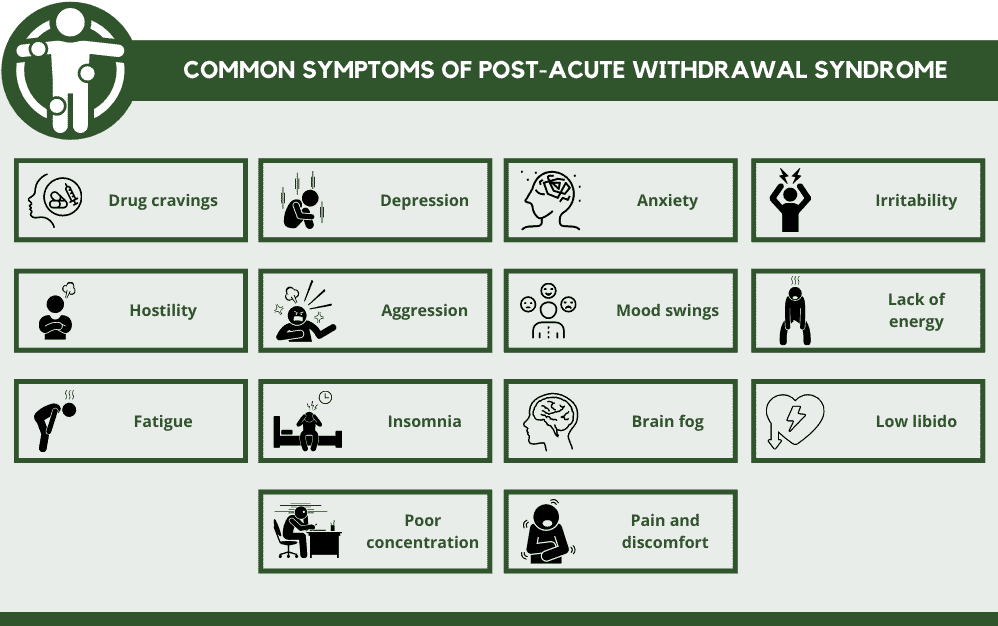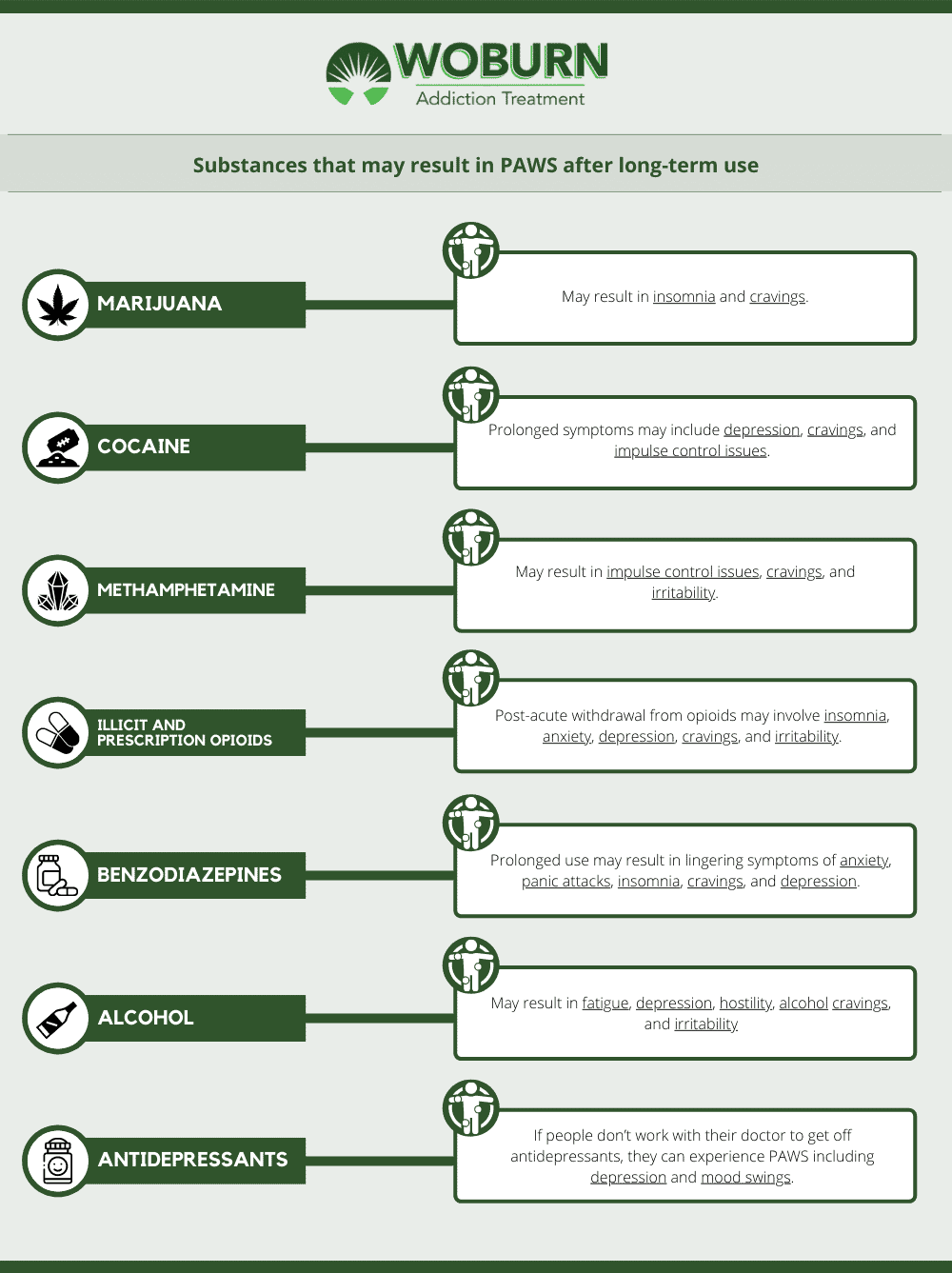The journey towards long-term sobriety isn’t always easy. The first days and weeks of recovery can be the hardest part. This is because most individuals experience drug or alcohol withdrawal symptoms in the first days and weeks after stopping substance abuse. Withdrawal symptoms occur when someone who is physically dependent on drugs or alcohol abruptly stops using them rather than gradually tapering off. Alcohol, illegal drugs, and prescription drugs all have the potential to cause withdrawal.
Drug and alcohol withdrawal can happen in two stages. The first stage is known as acute withdrawal syndrome. Acute withdrawal syndrome can begin just hours after a person stops using drugs or alcohol and may last for one to two weeks. The second stage, however, can last much longer. Withdrawal symptoms that appear after acute withdrawal symptoms end and that linger for months and even years into sobriety are known as post-acute withdrawal syndrome (PAWS).
While symptoms of acute withdrawal are both physical and psychological, symptoms of post-acute withdrawal are primarily psychological. Lingering symptoms like depression, anxiety, cravings, and insomnia can pose serious obstacles that individuals in recovery must overcome. Drug and alcohol rehab centers in Massachusetts offer holistic and extended care to help individuals cope with PAWS while staying sober.
What is Post-Acute Withdrawal Syndrome (PAWS)?
PAWS refers to long-lasting and fluctuating symptoms that persist after symptoms of acute withdrawal have resolved. Symptoms may come and go unexpectedly or they may get worse when individuals face certain triggers. PAWS is most likely to occur in people with severe addictions or long-term drug use.
PAWS is a natural process that occurs while the brain slowly returns back to normal functioning over a period of sobriety. Just like it takes time for substances to alter brain chemistry, it takes time to restore it, too. Symptoms of PAWS may continue until the brain reaches a state of equilibrium where it is no longer expecting drugs or alcohol to enter the system. In other words, post-acute withdrawal is the brain’s way of fixing itself after sustaining damage from prolonged substance abuse.
Symptoms of PAWS and the Substances That Cause Them
Post-acute withdrawal symptoms may vary from one person to the next. They can begin a couple of weeks after getting sober and may last for up to two years. Most people experience fluctuating symptoms that come and go. Furthermore, the severity and duration of these symptoms are dependent on many individual factors such as the type of substance abused, the health of the individual, and the severity of their addiction.


Common symptoms of post-acute withdrawal syndrome include:
- Cravings
- Depression
- Anxiety
- Irritability
- Hostility
- Aggression
- Mood swings
- Lack of energy
- Fatigue
- Insomnia
- Brain fog
- Low libido
- Poor focus and concentration
- Mild generalized pain and discomfort
Substances that may result in PAWS after long-term use include:
- Marijuana – may result in insomnia and cravings
- Cocaine – prolonged symptoms may include depression, cravings, and impulse control issues
- Methamphetamine – may result in impulse control issues, cravings, and irritability
- Illicit and prescription opioids – post-acute withdrawal from opioids may involve insomnia, anxiety, depression, cravings, and irritability
- Benzodiazepines – prolonged use may result in lingering symptoms of anxiety, panic attacks, insomnia, cravings, and depression
- Alcohol – may result in fatigue, depression, hostility, alcohol cravings, and irritability
- Antidepressants – if people don’t work with their doctor to get off antidepressants, they can experience PAWS, including depression and mood swings
Without proper treatment, symptoms of PAWS can be extremely difficult to deal with and can make individuals vulnerable to relapse.

Get The Care You Need and Deserve
Woburn Addiction Treatment is a leader in the addiction treatment field, with proven success in facilitating long-term recovery. Our team of top clinical & medical experts specializes in treating addiction coupled with mental illness, ensuring that each person receives individualized care. Call us – we’re available 24/day, 7 days/week.
How a Drug Rehab Center Can Help Patients Cope With Post-Acute Withdrawal Syndrome
When PAWS first begins, it can feel like whiplash. People may be starting to feel better after acute withdrawal and getting excited about recovery just to be met with long-lasting psychological symptoms. Fortunately, drug rehab centers can help patients cope with their symptoms and learn how to manage them effectively.
Pharmacological Treatments
In some cases, post-acute withdrawal can be treated with prescription medications. For example, people who struggle with lingering opioid cravings can be prescribed naltrexone (Revia or Vivitrol) to help reduce their symptoms. People who struggle with anxiety or depression may be prescribed an antidepressant SSRI to help normalize brain chemistry. Similarly, someone who struggles with insomnia may be prescribed non-addictive sleep medication. These various pharmacological treatments can greatly improve symptoms of PAWS.
Peer Support Groups
Drug rehab centers hold group therapy sessions, facilitate support groups, and encourage long-term participation in support groups. Talking to a support group about your symptoms and getting suggestions of how to deal with them can be a very effective way of treating PAWS. Having the support of peers can also help individuals endure their symptoms and remain focused on their recovery.
Lifestyle Changes
Making simple lifestyle changes and practicing self-care are the best ways to cope with post-acute withdrawal syndrome. Drug rehab centers offer holistic care that teaches patients how to take care of their minds and bodies, thereby reducing the severity of symptoms. Examples of lifestyle changes patients are encouraged to embrace include:
- Regular exercise
- Healthy diet
- Journaling
- Regular sleep schedule
- Proper hygiene
- Healthy relationships
- Meditation
- Yoga
- Breathwork
- Affirmations
Begin Your Recovery Journey With Woburn Addiction Treatment Today
Post-acute withdrawal syndrome shouldn’t hold you back from enjoying life in sobriety. Here at Woburn Addiction Treatment, we help each of our patients identify, treat, and manage PAWS as well as other challenges they face in recovery.
If you or a loved one are struggling with addiction, please contact us today to learn about our treatment options and how we can help you begin your recovery.


